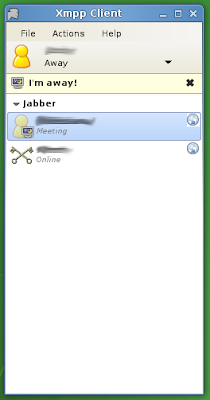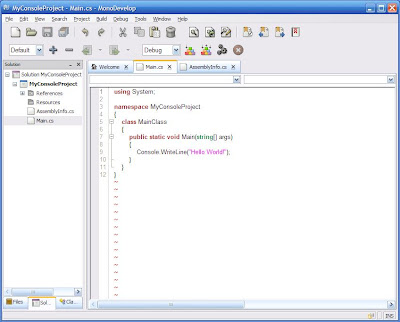Mono Hackweek Summary
Some of the Mono folks have blogged about their work for last week hack-week:
Paolo and Zoltan rearchitected the Regular expression library in Mono and got a 9x performance improvement in regular expression matching. The work had two components: redesign of the opcodes in the regular expression engine, and generating native code using Reflection.Emit. At least for the Language Shootout case, the new regular expression code is the second best (Tcl is faster, but apparently Tcl does not cope with Unicode regexes).
Wade worked on MythTV under XGL and making Tomboy Scale.
Andrew added Zeroconf/Bonjour support to Giver (a tool used to easily share files with friends or nearby users). And he also worked on Tasky a simple task management tool that integrates with Remember the Milk. He also wrote a command line tool to remotely control Tomboy. screencast.
Mike added support to importing data to his Exert Project (fitness/workout log software) that he started last Hack Week.
Sebastien revamped and added various new rules to Gendarme, our analyzer for CLI assemblies to spot errors and common programming mistakes.
He also improved its APIs and performance. He also started to fix some bugs in our class libraries based on the analysis done by Gendarme.
Jonathan ported his XMPP/VB.NET client to Mono:
And also got MonoDevelop running natively on Windows:
Jonathan Pryor spent the week polishing various loose ends. Including the release of his fantastic NDesk.GetOptions command-line parsing library and providing documentation to various components in Mono.
Atsushi worked on the implementation of WebHttpBinding (part of 3.5 WCF) and various other parts. See his blog for details.
Mark polished his MathMap composer tool.
Marek did some work towards replacing System.Reflection.Emit with Cecil. After some discussion we believe we can keep both backends, one to keep things as usual, and another to be used with MonoDevelop (so MCS provides the actual parsing for the editor intellisense and compile-as-you-type support).
Jackson worked on a couple of interesting demonstrations with Aaron, which hopefully they will be able to demo soon.
Carlos spent his time improving System.IO.Serial, there were a handful of events not implemented that he worked on.
Andreia and Marek worked on a Gtk# native client for Bugzilla.
Stephane created a new Gtk.Print/Cairo dialog for F-Spot and worked on support for TimeZones in F-Spot (code has not been commited yet).
Everaldo worked on packaging Mono for Maemo4. He has promised a number of blog posts detailing the work on GarMono, and the new packages that will be included on it.
Rolf continued to replace SRE with Cecil in the VB.NET compiler.
Lluis worked on improving Mono.Addins and creating an add-in for authoring add-ins in MonoDevelop.
Paolo early on also extended C# to allow inline-IL assembly language code (similar to __asm__ in C or C++ in some compilers). See the blog post for the various samples of C# with embedded IL.
Chris worked on a scheme compiler.
Jeff learned more about Regular Expressions than he wanted to. Update: Jeff wrote an add-in for MonoDevelop to do Evolution plugins in C#.
Update: I had not finished reading all the status reports on the mailing list. Dick Porter wrote bluetooth support for F-Spot. There is a bug in the system underlying bluetooth C libraries that prevents it from working correctly out of the box, but hopefully that will get fixed.
Update: Mike Krueger improved extensively the search functionality in MonoDevelop, it now implements Emacs/Mozilla-like searching and he also wrote an assembly browser/decompiler that is plugged right into the solution browser.
As for me, I spent the week going insane over the incredibly frustrating T61p problems with performance. Inspired by Marek's encouragement to learn LINQ and functional-style programming, I started a project that I abandoned quickly to implement a managed spreadsheet.
At least I learned two lessons: am more comfortable writing tokenizers using the regular call-back system than the automatically generated state machine from generators. I also learned that OOXML is very easy to parse, but it would be nice for PDF files to have hyperlinks in the spec.
I am probably missing a few things, but I did not catch all the blog posts this week.
Posted on 23 Feb 2008
Blog Search
Archive
- 2024
Apr Jun - 2020
Mar Aug Sep - 2018
Jan Feb Apr May Dec - 2016
Jan Feb Jul Sep - 2014
Jan Apr May Jul Aug Sep Oct Nov Dec - 2012
Feb Mar Apr Aug Sep Oct Nov - 2010
Jan Feb Mar Apr May Jun Jul Aug Sep Oct Nov Dec - 2008
Jan Feb Mar Apr May Jun Jul Aug Sep Oct Nov Dec - 2006
Jan Feb Mar Apr May Jun Jul Aug Sep Oct Nov Dec - 2004
Jan Feb Mar Apr May Jun Jul Aug Sep Oct Nov Dec - 2002
Jan Feb Mar Apr May Jun Jul Aug Sep Oct Dec
- 2022
Apr - 2019
Mar Apr - 2017
Jan Nov Dec - 2015
Jan Jul Aug Sep Oct Dec - 2013
Feb Mar Apr Jun Aug Oct - 2011
Jan Feb Mar Apr May Jun Jul Aug Sep Oct Nov Dec - 2009
Jan Feb Mar Apr May Jun Jul Aug Sep Oct Nov Dec - 2007
Jan Feb Mar Apr May Jun Jul Aug Sep Oct Nov Dec - 2005
Jan Feb Mar Apr May Jun Jul Aug Sep Oct Nov Dec - 2003
Jan Feb Mar Apr Jun Jul Aug Sep Oct Nov Dec - 2001
Apr May Jun Jul Aug Sep Oct Nov Dec

